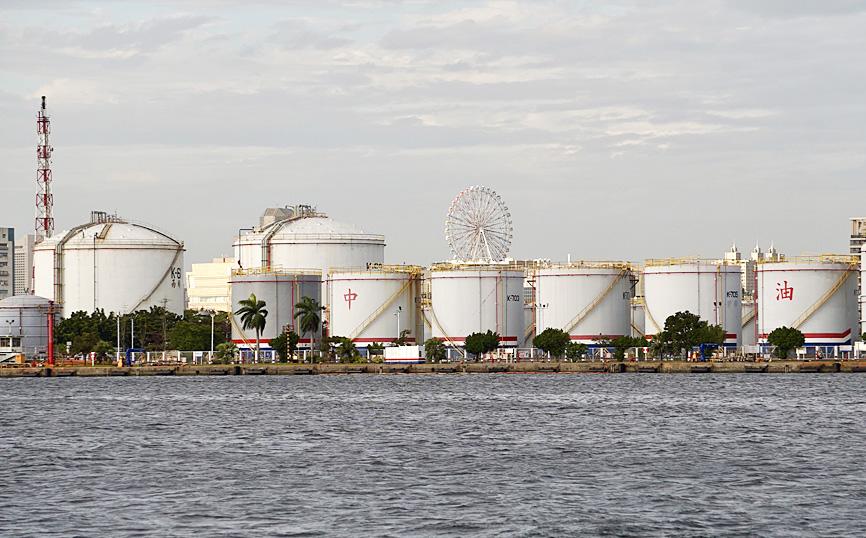The nation has sufficient energy reserves, the Ministry of Economic Affairs said yesterday, dispelling concerns over energy disruption after China announced it would hold live-fire drills in waters surrounding Taiwan from today to Sunday.
The drills are in retaliation for US House of Representatives Speaker Nancy Pelosi’s visit to Taiwan. The planned exercises stoked fears that energy shipments could be delayed and put Taiwan’s energy supply at risk.
The ministry said in a statement that the government has accumulated energy reserves for local consumption through state-run companies.

Photo: CNA
All vital energy stocks exceed regulatory safety levels, it said.
As building up energy reserves is an issue of national security, the government has made numerous contingency plans against Chinese military exercises, the ministry said.
“The nation has rules to keep energy reserves at safe levels. Besides, we have multiple energy sources,” the ministry said. “We are well-prepared with sufficient energy reserves. The public should not be worried about supply disruptions.”
The nation has crude oil reserves equivalent to 146 days of consumption, while natural gas reserves are at a level equivalent to 10 to 11 days of local consumption, the ministry said.
The nation’s coal stockpiles are sufficient for 39 days, it said.
To keep the nation’s energy reserves in check, the ministry is monitoring energy stocks with Taiwan Power Co (台電) and CPC Corp, Taiwan (台灣中油) on a daily basis, the statement said.
In light of China’s planned drills, gas suppliers are rerouting or reducing the speed of some liquefied natural gas (LNG) tankers en route to North Asia, people familiar with the matter said.
Shipments to Taiwan and Japan this weekend would be affected, the people said.
Shipping companies are also assessing their options and the actions threaten to disrupt one of the world’s busiest waterways.
Local branches of China’s maritime safety administration have issued multiple warnings for ships to avoid certain territories, citing the military exercises, while Taiwan’s Maritime and Port Bureau warned ships to find alternative routes to access and depart from seven major ports in Taiwan during China’s drills, the Chinese-language Apple Daily reported yesterday.
While the disruptions could exacerbate a shortage of LNG amid an energy crunch, delays of a few days are not uncommon. Shippers often face typhoons at this time of year that create similar disruptions.
Additional reporting by Bloomberg

UNCERTAINTY: Innolux activated a stringent supply chain management mechanism, as it did during the COVID-19 pandemic, to ensure optimal inventory levels for customers Flat-panel display makers AUO Corp (友達) and Innolux Corp (群創) yesterday said that about 12 to 20 percent of their display business is at risk of potential US tariffs and that they would relocate production or shipment destinations to mitigate the levies’ effects. US tariffs would have a direct impact of US$200 million on AUO’s revenue, company chairman Paul Peng (彭雙浪) told reporters on the sidelines of the Touch Taiwan trade show in Taipei yesterday. That would make up about 12 percent of the company’s overall revenue. To cope with the tariff uncertainty, AUO plans to allocate its production to manufacturing facilities in

Taiwan will prioritize the development of silicon photonics by taking advantage of its strength in the semiconductor industry to build another shield to protect the local economy, National Development Council (NDC) Minister Paul Liu (劉鏡清) said yesterday. Speaking at a meeting of the legislature’s Economics Committee, Liu said Taiwan already has the artificial intelligence (AI) industry as a shield, after the semiconductor industry, to safeguard the country, and is looking at new unique fields to build more economic shields. While Taiwan will further strengthen its existing shields, over the longer term, the country is determined to focus on such potential segments as

COLLABORATION: Given Taiwan’s key position in global supply chains, the US firm is discussing strategies with local partners and clients to deal with global uncertainties Advanced Micro Devices Inc (AMD) yesterday said it is meeting with local ecosystem partners, including Taiwan Semiconductor Manufacturing Co (TSMC, 台積電), to discuss strategies, including long-term manufacturing, to navigate uncertainties such as US tariffs, as Taiwan occupies an important position in global supply chains. AMD chief executive officer Lisa Su (蘇姿丰) told reporters that Taiwan is an important part of the chip designer’s ecosystem and she is discussing with partners and customers in Taiwan to forge strong collaborations on different areas during this critical period. AMD has just become the first artificial-intelligence (AI) server chip customer of TSMC to utilize its advanced

While China’s leaders use their economic and political might to fight US President Donald Trump’s trade war “to the end,” its army of social media soldiers are embarking on a more humorous campaign online. Trump’s tariff blitz has seen Washington and Beijing impose eye-watering duties on imports from the other, fanning a standoff between the economic superpowers that has sparked global recession fears and sent markets into a tailspin. Trump says his policy is a response to years of being “ripped off” by other countries and aims to bring manufacturing to the US, forcing companies to employ US workers. However, China’s online warriors